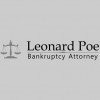
Financial relief is available to you. As a licensed attorney practicing under the Federal Bankruptcy Code I am considered a debt relief agency, and I help people file for bankruptcy under the Bankruptcy Code. I can stop the harassing phone calls, the embarrassing collection letters, and the depressing credit card balances that never go down.
I offer a free consultation to review your particular financial situation and advise you of your options under the Bankruptcy Code. You may also have non-bankruptcy options under state and federal law, which I can also advise you of. I don't charge people for telling them what their options are. If I can help you with your situation, I will work on a fixed fee basis, and we will work out a payment plan to fit your budget.
I offer a free consultation to review your particular financial situation and advise you of your options under the Bankruptcy Code. You may also have non-bankruptcy options under state and federal law, which I can also advise you of. I don't charge people for telling them what their options are. If I can help you with your situation, I will work on a fixed fee basis, and we will work out a payment plan to fit your budget.
Services
I was raised in Dunedin, having moved here as a child in 1968. After graduating from Dunedin High School in 1977, I attended the University of Florida, majoring in Accounting and graduating with honors. I then attended the University of Florida Law School and earned my Juris Doctor in 1983. I practiced in Tampa for ten years, then passed the North Carolina Bar and relocated to Asheville for the next 23 years.
Chapter 7 allows you to keep your secured debts (house, car, etc.) just as they are, and allows you to discharge (wipe out) your unsecured debt. Some debts cannot be discharged in Chapter 7, such as student loans, recent income taxes, and alimony or child support. But medical bills, credit card debt, old income taxes, judgments repossession deficiencies, back rent from an old apartment, and the like can be totally eliminated.
Chapter 13 is usually used to stop a mortgage foreclosure and catch up the payments. Sometimes Chapter 13 is called a "wage earners" plan or a "consolidation plan" and it gives you more flexibility with your secured debt and other debts not discharged in a Chapter 7. Chapter 13 consolidates all your debt into one affordable monthly payment.
If you are self-employed, or work as an independent contractor (getting a Form-1099 for your tax return), you can still file under Chapter 7 or Chapter 13. Small "mom & pop" operations can often benefit from these simpler chapters that take care of business debts along with the personal debts. If, however, you need to file for the reorganization of a substantial corporation, LLC, or similar entity, you may need to file under Chapter 11.
Reviews

Be the first to review Leonard Poe.
Write a Review